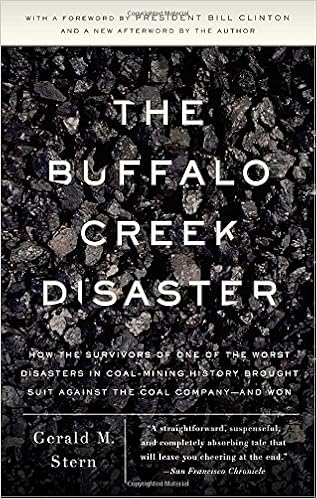Although this book will give you a summary of this ecological disaster, but it is less about the disaster itself and more about the litigation that would follow it. As such, it's a great book for those interested in the process of lawyering. As a book about ecology, it's not as engaging. What the book did do was remind me to a large extent why I dislike our court system so much.
The book is written from the point of view of the litigater who would bring suit on behalf of about six hundred people affected by the disaster. As one discovers, both sides are inherently interested in getting as much as they can (or giving as little as they can). The people affected by the disaster, indeed the problems that become inherent in the disaster, seem to fall into the background, even if the litigater's intent is both to make the disaster painful enough that the mining company responsible will take more careful actions in the future and to get better compensation for the people involved.
In the end, who makes the money? Who is hurt?
The disaster is the result of some poorly built slag dams that hold refuse from the mining process and hold back a river. Below these dams are several small communities. After a heavy rainfall, the dams give way and many watch their homes and families wash away. Over one hundred die.
The mining company offers people about $4,000 dollars in compensation to each family affected by the loss of a home. This is the early 1970s, so that's more like $24,000 in today's terms. This is rural West Virginia, but that's still not enough really to pay for the home, let alone the deaths caused by the disaster. That should be enough to make one angry.
The mining company claims what happened was an act of God, an accident, something out of its control. Stern shows the detective work involved in trying to find evidence that the company has been reckless, a point of importance if he is to get as much compensation for his clients as he wants. He eventually shows that the company knew of the problems with the dams, which the company itself refuses to call dams so as to prevent itself from being liable. Likewise, the company claims it can't be responsible, since it's just a holding company for the actual company responsible, another tactic to get off the hook for the disaster.
This is what's so disgusting to me about the whole process. The company does its utmost to avoid paying out fair compensation to those affected by using various legal maneuvers, all to preserve profit. At the same time, there's another part of me that has a hard time believing that the company (or at least a number of the people involved) is that cold hearted. Would it deliberately create weak dams? Compensation may be weak, but too generous a compensation would destroy the company completely.
I was reminded of a film about a small investment company that was mostly obliterated in the 9/11 attack. The president of the company, who'd lost his own brother in the attack, promised to keep paying families the salaries of the dead workers; in short order, however, he realized that he couldn't afford to do so, and cut the families off much earlier than expected. People were angry about his greed. But if the company was to survive, he had to stop compensation. Either way the victims lose out. Sometimes, there's greed, and sometimes there's making ends meet in order to keep people working who are still able to work.
Stern eventually gets about $13,000 in compensation for his clients, or about $81,000 in today's dollars, which might cover a house in the area. He does so by asking for about five times that much and then settling for the smaller sum. He does so by claiming psychological trauma (what would become known as PTSD) for his victims, even those away at the time of the disaster. From that $13,000, people have to pay legal fees of about $4000, leaving them with just roughly twice what the company was going to shell out anyway. They're moderately better off.
But who's much better off are the lawyers on both sides, who make essentially about $75 an hour on the deal (forty thousand hours of work for the litigater). Such a case provides lots of work--granted, work that Stern and his company would not have ever gotten paid for unless the case was won, since they were working pro bono. That's the sad part to me, that if the company had been a bit more generous and sympathetic to begin with, and if a lawsuit could have been avoided, the victims would have been much better off and the company too. Instead, third-party lawyers cost both parties a huge chunk of dough.
Friday, December 29, 2017
On "The Buffalo Creek Mining Disaster" by Gerald M. Stern ****
Labels:
Books,
Four-Star Nonfiction,
Gerald M. Stern,
Nonfiction
Subscribe to:
Post Comments (Atom)







No comments:
Post a Comment